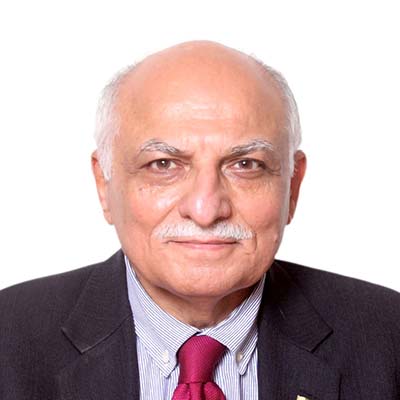Narratives talks to three leading business leaders – Ehsan Malik, Majyd Aziz and Zubair Tufail – to ascertain the mood of the moment.
The government has surprised businesses by demanding 100 percent import payment in dollars in advance, and through imposing additional regulatory duties on imports.

CEO, Pakistan Business Council.
Firstly, business activities were bound to slow down in the wake of the government U-turn. It withdrew many tax incentives and other supportive measures it had provided three months ago – on July 1 – through the Budget 2021-22.
Secondly, the International Monetary Fund (IMF) is under US influence, being tough on Pakistan to get Islamabad to agree to accept its conditions, like an increase in electricity prices, for example, in order to resume a $6 billion loan programme to the country. In addition to this, there is the worsening diplomatic relationship between Pakistan and the US on Afghanistan, and a deepening financial crisis in Kabul may take a toll on Pakistani businesses and the economy as well.
The government had cut the rate of taxes to accelerate business activities and to achieve a higher growth of 4.8 percent in fiscal 2022, without realising the fact that in the past, the country’s import payment pressure mounted whenever the domestic economic growth surpassed 4 percent. The government has surprised businesses by demanding 100 percent import payment in dollars in advance, and through imposing additional regulatory duties on imports to suppress the demand for US dollars amid low supplies in the economy.
The shift in the government strategy for businesses, from supportive to suppressive, suggests it had announced and implemented incentives without doing proper homework. Visible is the lack of planning and lack of understanding as to how pro-growth and business friendly policies might react in shape of a surge in demand for dollars for imports, and widening trade and current account deficits.
A study by the Pakistan Business Council, which is in the middle of its completion at present, suggested that the 65-70 percent growth in import payments in the current fiscal year to date were due to the price of the global commodity. Growth trends in the large-scale manufacturing (LSM) sector suggest industrial production was far from overheating the economy.
Imports were bound to spike in the aftermath of the budgetary measures. The economic team had failed to factor in where the global commodity prices would be heading when global economies would reopen from the lockdown imposed to contain the Covid-19 pandemic. Many businesses are still trying to understand the shift in government policies.
The businesses which have made investments will obviously not withdraw them, but will almost surely opt to adjust in the newly provided business environment – particularly those new businesses which were set up to meet local consumption.
Most of the new investment was made by the export sector, like textiles. The measures, particularly the deprecation in the rupee, are not going to hurt them, rather they will benefit exporters.
The government has rightly taken targeted measures to curtail car financing through the banks, which was one strong reason for an increase in import luxury cars and parts. Now it should maintain the condition of 100 percent import payments in advance, and impose additional duties on import for finished goods like luxury cars, TVs, refrigerators, etc. However, it needs to review such policies for parts importers, as importers run their assembling plants and provide job opportunities for locals.
The government also relaxed the rules for housing, construction and allied industries to accelerate economic growth and create job opportunities. Similarly, the central bank introduced subsidised loans for setting up new industries and expending the existing one through the Temporary Economic Refinance Facility (TERF). Both the initiatives were bound to increase imports in the shape of raw material for cement and steel manufacturing and a plant and machinery. They imports were bound to create a demand for dollars. So had the government not factored in such development at the time of relaxing the rules? And now it is withdrawing several incentives and imposing new conditions.
The government did also not completely pass on the increase in international oil prices to end-consumers in the country, perhaps for creating a political buffer. Pakistan is currently selling oil at the cheapest rate in the region. The price in India is double compared to that in Pakistan.
The economic planners also failed to realize the end of war in Afghanistan would result into curtailing dollars supply from there into Pakistan. US and NATO forces were spending millions of dollars for themselves and on the war-torn country.
The roads ahead for business are bumpy. The government needs to be extra cautious to create a balance between measures to curtail incentives and still the economy keep growing.
The situation now once again requires the government to accept the tough conditions that are expected to be dictated by the IMF… The government has no choice but to agree with the lender in these troubled times.

Former President, Karachi Chamber of Commerce & Industry.
The elite culture at the centre of the government and a lack of proper future planning have dragged businesses back into troubled waters once again.
Pakistan being an emerging market, which is being run through acquiring a heavy foreign debt, has imported thousands of expensive sports utility vehicles (SUVs) in the name of supporting economic activities. On the other hand, the backbone of the economy, the small and medium-sized enterprises (SMEs), have been made to run pillar to post.
The government liberalised imports in a manner that seemed to indicate it had won the lottery. The ground reality meanwhile, is that over half of the country’s foreign exchange reserves comprise the money borrowed from friendly countries including China, Saudi Arabia, the United Arab Emirates (UAE) and multilateral lenders like the International Monetary Fund (IMF), the World Bank (WB) and the Asian Development Bank (ADB). These monies the nation owes and will have to return sooner or later.
The liberal imports widened trade and current account deficits to the level that they started melting the borrowed foreign exchange reserves, which resulted in badly depreciating the rupee against the US dollar and other world currencies.
The situation now once again requires the government to accept the tough conditions that are expected to be dictated by the IMF. The government has no choice but to agree with the lender in these troubled times.
The country is being run on an ad hoc basis. The question is, why is the government administration so inept at managing business and economic affairs? It always goes to the world markets to buy essentials like energy (oil and gas) and foods (wheat, sugar and cooking oil) after their prices skyrocket. Why does it keep sleeping when the prices of these commodities are down, despite the fact that they know of the estimated shortfall in the local productions of such items.
The government says you don’t need to panic, but its economic managers make panic moves, like the ones demanding all businesses to make 100% import payments in advance, and the imposition of additional import duties to discourage imports.
This may be the right decision. However, the implementation of the decision should be targeted. The importers of luxury goods should pay 100% import in advance and pay higher duty on imports. However, the import payment condition and import duty should remain relaxed for the importers of raw material for industries and agricultural output.
Conditions should also remain relaxed on the import of plants and the machinery for industrialisation. Subsidised loans for the import of the machinery for industries through the Temporary Economic Refinance Facility (TERF) was a commendable scheme, and this will contribute towards accelerating economic growth.
The problem is, the majority of the people who are part of the economic council in the country, have remained in almost every government for the past two decades. They have done nothing for the masses or for business. Most of them belong to the elite. They throw the budget proposals received from industrial associations into the dustbin, and remain unaware of the situation on the ground. That’s why the backbone of the economy, the SME has remained at the crossroads.
All decisions should not be taken in Islamabad. Karachi, Lahore, Faisalabad and Peshawar are the centres of business. So business decisions should be taken there, with the stakeholders on board.
The private sector should be allowed on a permanent basis to import essential goods like food items at any time through the year, and the government should reduce its role to the level of providing an enabling environment. However, non-essential imports should be charged high duties to stabilise the rupee against foreign currencies.
And the compression in imports should be made ensuring that they do not hinder a growth in exports. Pakistan remains an agricultural country, but it has remained unsuccessful in improving its cotton production in the past six-seven years. So-called agriculture research centres have existed for decades in the country, but they have failed to even introduce new seeds to improve the per acre yields of cotton.
The cost of doing businesses and the cost of living both are on the rise in the wake of excessive deprecation in the rupee against the US dollar, and the spike in commodity prices at world markets.

Former President, Federation of Pakistan Chambers of Commerce & Industry (FPCCI).
The private sector works for profit and most of the businesses in Pakistan are running in profit at present. However, controlling the ever rising inflation has remained the single largest challenge in the country, which is equally hurting businesses and people, particularly the poor segments of society.
The cost of doing businesses and the cost of living both are on the rise in the wake of excessive deprecation in the rupee against the US dollar, and the spike in commodity prices at world markets.
Industrialists and businessman usually pass on the increase in the cost of doing business to end-consumers and manage to survive. But how can a family with only one bread and butter earner with a salary of around Rs. 20,000 a month – which the federal government set as the minimum wage in the last budget of 2021-22 – survive in the current environment with its ever-mounting cost of living? The drop in the purchasing power of the common man will directly or indirectly impact businesses in the time to come, as the development will cause a slowdown in the sales of industrial goods. Pakistan remains a country where businesses are mostly run through mass and volumetric sales of commodities rather than through selling expensive brands in niche markets. Exporters, however, can develop ‘made in Pakistan’ brands through research and development for overseas markets.
A recent study suggests 87 of the top 100 companies listed on the Pakistan Stock Exchange (PSX) have earned a record high profit of Rs. 875 billion in the previous fiscal year ending June 30, 2021. The profit was 56 percent higher than the Rs. 562 billion registered in the prior fiscal year (2020).
The companies which earned the profit were from the sectors including textile and cement makers, car assemblers, fertiliser manufacturers, banks, power and oil marketing companies.
The inflation-propelled increase in the cost of doing business is, however, set to reduce the rate of profit of business as well.
The government of Prime Minister Imran Khan and his economic team have failed to control high inflation, perhaps for the reason that there are only a few honest and dedicated people in his team, Khan and Federal Minister for the Planning Commission, Asad Umer, being two of them.
The problem with PM Khan is that he has no experience in running institutions and businesses. His political aide Umer does have such experience. However, he was unfortunately removed from the mainstream federal finance ministry in the initial days of the incumbent government.
The government continued to increase petrol, power and gas prices consistently which is contributing towards high inflation. It increased the petrol price by Rs. 5 per litre in September, and the latest reports suggest it is considering increasing the petrol price again, following the surge of the international oil price on September 27, which reached close to a three-year high at $80 per barrel.
Additionally, the government may also agree to further increase electricity and gas prices at the behest of the International Monetary Fund (IMF) at the negotiations beginning October 4, scheduled for the resumption of the $6 billion loan programme. Pakistan will have limited choices at the negotiations, and may have to accept up to 95 percent of the conditions demanded by the IMF to resume the loan programme.
The government should slash the rate of the sales tax from the current huge 17 percent to 10 percent. This would automatically decelerate inflation by 7 percent nationwide. If it cannot reduce the rate across the board, it must reduce the tax on food, including wheat, wheat-flour, cooking oil, ghee and sugar to help poor people survive. At the meagre salary stipulated as the minimum wage, they probably barely manage to eke out even two meals a day.
As far as the question of how it would meet its revenue collection targets if it slashed sales tax, it would be pertinent to mention that the government is making windfall collection of taxes through petroleum products. And it could further increase its revenue collection by increasing the rate of taxes on the sale of luxury cars. Inflation is no issue for the rich segment of the society. They would probably readily agree to pay a higher price for cars.
The government has rightly imposed regulatory duties on the import of luxury cars and also rightly tightened conditions for offering car financing through banks.



